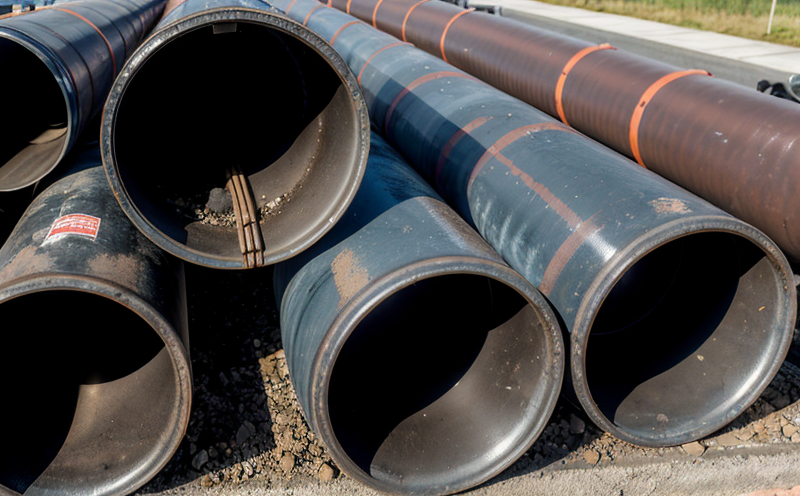UNE EN 1519-2 Testing of Plastic Soil and Waste Pipes
The UNE EN 1519-2 standard is a crucial part of ensuring the quality, safety, and durability of plastic soil and waste pipes used in various construction projects. This international standard covers the physical and mechanical testing procedures for these types of pipes to ensure they meet stringent requirements set by regulatory bodies.
Plastic soil and waste pipes are widely used in residential, commercial, and industrial applications due to their flexibility, durability, and cost-effectiveness. However, ensuring that these pipes can withstand the stressors of real-world conditions is paramount. The UNE EN 1519-2 standard provides a framework for testing these pipes under various environmental and mechanical stresses.
One of the primary tests conducted under this standard involves determining the resistance to hydraulic pressure. This test evaluates how well the pipe can maintain its integrity when exposed to high-pressure water flow, simulating the conditions it would encounter in real-world applications. Another critical aspect is the modulus of elasticity, which measures the material's ability to return to its original shape after being deformed.
The testing process for UNE EN 1519-2 includes several steps. First, the pipes are carefully prepared according to the standard’s specifications, ensuring that any pre-existing damage or defects are minimized. The pipes are then subjected to various mechanical and hydraulic tests using specialized equipment. These tests aim to replicate the conditions under which these pipes will be used in actual applications.
The acceptance criteria for UNE EN 1519-2 are strictly defined, ensuring that only high-quality materials meet the standards required by this testing protocol. Compliance with these criteria is critical as it ensures the reliability and longevity of plastic soil and waste pipes, thereby reducing maintenance costs and potential disruptions to operations.
Understanding the context in which UNE EN 1519-2 applies helps in appreciating its importance. In residential settings, for instance, proper installation and testing of these pipes are essential to prevent leaks and blockages that can lead to significant inconveniences. In industrial applications, ensuring the integrity of plastic soil and waste pipes is crucial for maintaining efficient operations.
By adhering to UNE EN 1519-2, manufacturers and installers can ensure they meet international standards, thereby enhancing their product's reputation and marketability. This standard also plays a vital role in promoting sustainable construction practices by ensuring the longevity and reliability of infrastructure components.
Why It Matters
The UNE EN 1519-2 testing protocol is not just about meeting regulatory requirements; it is essential for ensuring the long-term success and sustainability of projects involving plastic soil and waste pipes. Compliance with this standard can significantly reduce the risk of premature failure, which could lead to costly repairs or replacements. Moreover, by adhering to these standards, stakeholders demonstrate their commitment to quality and safety, enhancing their reputation in the industry.
The physical properties tested under UNE EN 1519-2 directly impact the performance and longevity of plastic soil and waste pipes. For instance, a pipe that fails to meet the modulus of elasticity requirements may not be able to withstand the stressors it encounters during installation or use. Similarly, hydraulic pressure tests ensure that the pipe can handle the flow rates and pressures expected in real-world applications.
From a broader perspective, ensuring compliance with UNE EN 1519-2 contributes to environmental sustainability by promoting the use of durable materials that require minimal maintenance over their lifespan. This is particularly important as construction industries increasingly focus on reducing waste and minimizing their ecological footprint.
The importance of this testing cannot be overstated, especially in light of increasing regulatory pressures and public expectations for environmentally responsible practices. By adhering to UNE EN 1519-2 standards, manufacturers and installers can ensure they meet these demands while also providing reliable, long-lasting products that enhance the overall performance of construction projects.
Eurolab Advantages
At Eurolab, we bring a wealth of expertise to UNE EN 1519-2 testing services. Our team of certified professionals ensures that every aspect of the testing process is carried out with precision and accuracy. With state-of-the-art equipment and facilities, we can replicate real-world conditions in our laboratories, providing clients with reliable data for decision-making.
Our commitment to quality extends beyond just conducting tests; it also includes ensuring that all results meet or exceed UNE EN 1519-2 standards. This dedication to excellence is reflected in the high level of customer satisfaction we achieve. Clients can trust Eurolab to deliver accurate, timely, and comprehensive testing services.
With a strong reputation for reliability and expertise, Eurolab has earned the trust of many industry leaders who rely on us for their critical testing needs. Our extensive experience allows us to offer tailored solutions that meet the specific requirements of each client. Whether it's residential, commercial, or industrial projects, Eurolab is equipped to handle them all.
Additionally, our commitment to sustainability and environmental responsibility aligns with the broader goals of many organizations today. By providing high-quality testing services that adhere to international standards like UNE EN 1519-2, we contribute to building more sustainable infrastructure.
Customer Impact and Satisfaction
- Ensures compliance with international standards like UNE EN 1519-2, enhancing product reliability and longevity.
- Saves time and resources by identifying potential issues early in the testing process.
- Improves customer satisfaction through consistent quality assurance measures.
- Reduces maintenance costs and disruptions due to premature failures or leaks.
- Promotes sustainable construction practices by using durable materials that require minimal maintenance over their lifespan.





